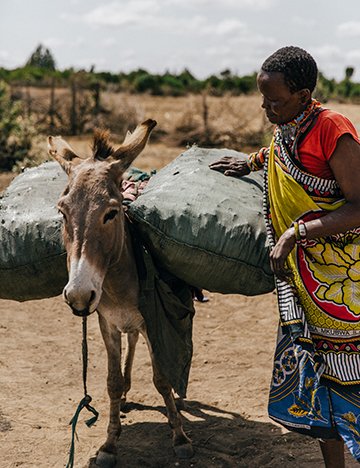One Health at Brooke case study – donkey skins trade
This case study illustrates how the donkey skins trade is a threat to animals, people and the environment.
Donkey skins trade – a threat to animals, people and the environment

In 2019, an outbreak of equine influenza in West Africa killed 62,000 animals in Niger alone. According to the World Organisation for Animal Health (OIE) this was caused by cross-border trade in donkeys to produce ejiao, a gelatin made from boiling donkey skins used in traditional Chinese medicine and cosmetics. Glanders was also on the rise in areas where the trade was most prominent. Whilst transmission to humans is currently rare, it is more common in those working closely with equids and can be fatal or result in chronic infection.
Between 2014 and 2018, four slaughterhouses opened across Kenya. The number of donkeys killed, both in these licensed slaughterhouses and in the bush, was estimated at around 1,000 per day. Donkeys were slaughtered inhumanely and without veterinary supervision, and the meat and skins were not inspected.
Sometimes, especially where the donkeys had been stolen, the animals were slaughtered and skinned in the bush, and their carcasses left behind to pollute soil and water. Brooke East Africa also received reports of traders selling donkey meat at markets for human consumption, disguising it as other types of meat.
The donkey skins trade is frequently used to conceal other agro-crimes e.g. tiger skins are hidden in shipments of ‘legal’ donkey skins. Illegal wildlife products are often sold by same people who trade in donkey skins.
Donkeys are also smuggled for slaughter from surrounding countries into Kenya and Nigeria. Live animals, skins and associated products cross borders illegally and without any surveillance, carrying potentially dangerous pathogens, some still unknown.
Brooke is supporting communities to protect their donkeys from theft and emphasizing the lifelong value of these animals to dissuade people from selling them. We are also changing law, policy and practice to safeguard these animals, and tackling demand for donkey skins.
Impact to-date
Thanks to a Brooke-led campaign, the Kenyan government announced a national ban on the slaughter of donkeys for the skins trade in February 2020. To protect Africa’s donkey populations in the short term, we are working with regional institutions and international stakeholders to push for a continent wide ban on donkey slaughter for ejiao.
Significance to One Health
The growing trade in donkey skins is a threat to animal and human health and wellbeing, as well as the environment. Transport and slaughter of donkeys for skins and meat without veterinary surveillance, coupled with unregulated cross-border trade of live animals and their products, could lead to another pandemic of a zoonotic disease.
The global COVID-19 pandemic has exposed a major weakness in animal health systems, a vital pillar of One Health. We need a better surveillance system in places were the animals are kept, transported and slaughtered.
In the long run, strong animal health systems and robust governance structures around the trade in animal parts are necessary to protect animals and the people who depend on them from the loss of livelihoods, health and lives.
Brooke's Donkey Skin Trade campaign
Read more on our campaign to end the donkey skin trade.
